This is where I'll post everything I can't post on FaceTwiGram 😝
Don't wanna be here? Send us removal request.
Photo

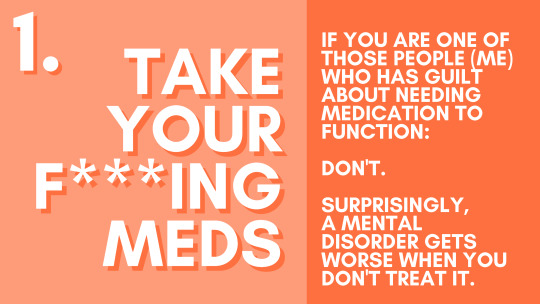
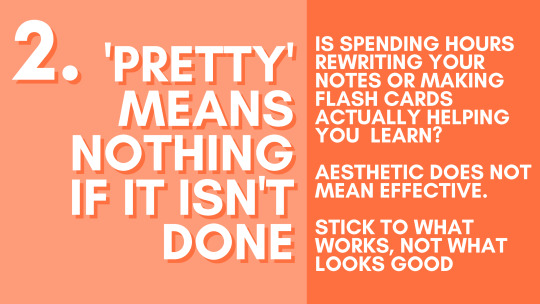
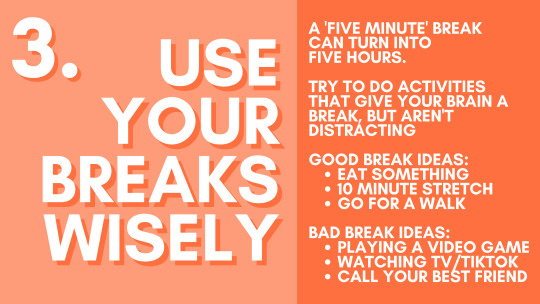
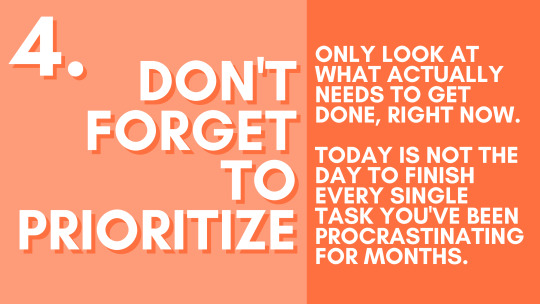
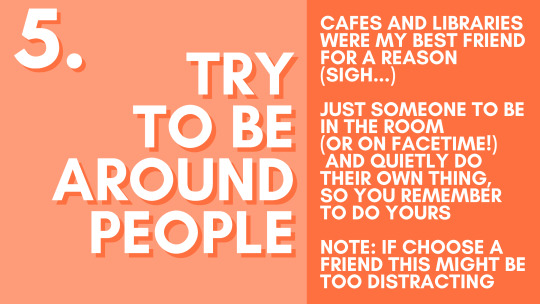
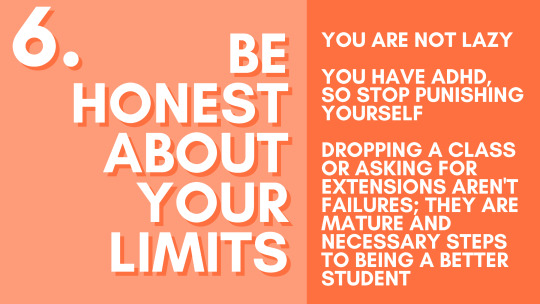
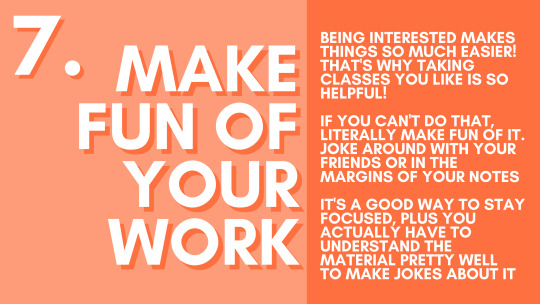

some people were asking for a actual and i can never pass up an opportunity to procrastinate so here’s just a couple of things i always need to remind myself of…now back to my paper :(
34K notes
·
View notes
Text
the no bullshit guide to getting your shit together: for the lazy student
Let’s be honest: time management and organization? They’re really hard. Sure, at first you might feel like you’ve gotten the hang of them, that you’re in control of your life. But how often have you fallen off the wagon? Procrastinated on one thing and the next moment, you’re behind in all your classes? I know that sometimes laziness feels like a part of who you are, but honestly, fuck that. Do you really want to give up your success for the disinterest of a moment?
If your answer is no (it better be no, or you really need to get your priorities straight), let’s get to it.
STEP ONE: BE HONEST WITH YOURSELF
“This class doesn’t even matter.” “I don’t care about my grades.” “I can finish this the day before.” Sound familiar? You might feel great now, but when you’re staring down at your report card later, it’ll feel like you just got punched.
This is a cliche, but the greatest obstacle to your success is yourself - especially the lies you tell yourself! Sit yourself down and be honest about what you need to improve on. Be as blunt as you can, but for god’s sake, don’t throw yourself a pity party! There’s no use agonizing over what you can’t change. Instead, set realistic, achievable goals, and make a game plan. Struggling with math? Go to extra help. Behind in all your classes? Stay in for a couple nights and actually work.
STEP TWO: STOP WITH THE FANCY SHIT
Now you know what your goals are, but maybe you want some inspiration, so you log on to tumblr and are instantly bombarded by all these beautiful, well lit shots of the most gorgeous bullet journals, planners, and notes. Impressive, right? Well, I’m gonna let you in on a little secret: they’re all useless! A simple phone planner works just as well, if not better, than a fancy agenda, because you’ll always have it on you, it’s not a hassle to carry around, and you don’t feel obligated to make it look pretty.
Riddle me this, where are you going to find all this extra motivation to keep prettying up your bullet journal? To write all your notes in perfect, colour coded printing? There aren’t many times in life where taking the easy was out will actually benefit you, so take advantage! Stop wasting your time; get a phone planner and write your notes in your natural goddamn handwriting.
STEP THREE: CLEAN YOUR ROOM
Yep, your entire room - not just your study space! This one can be put on the back burner for a bit if you’re on a really pressing deadline, but I wouldn’t recommend it. I’m notoriously messy, and if I don’t watch myself, I’d find myself in dirty-laundry-and-old-notes hell. A little bit of organized chaos is fine, I even encourage it! But try working when your desk is covered in mounds of paper and you have nowhere to put your laptop – it’s just not conducive to success.
Keeping your entire room clean is a way to stave off stress, frustration, and even embarrassment, because nobody wants to show potential roommates how much of a mess they are.
STEP FOUR: ACTUALLY WORK
Yeah, I know what you’re thinking: “actually work? Who does this girl think she is?” I’d probably think the same thing, except I’ve learned the valuable lesson of sucking it the hell up, and you will too. When you get home from work, grab a snack and work. When you have a free period, figure out what’s due and work. Stop reasoning yourself out of work: you’re not going to finish this later, and that will be on the test. There’s really not much to say about this one, because it’s the step that requires the most raw effort, and you’re really only going to find that within yourself. Tell yourself what’s at stake, and realize that, by setting the standard for your mediocrity now, you’re potentially trapping yourself in a cycle that will last for years.
STEP FIVE: CUT YOURSELF SOME SLACK
Maybe you’ve been on top of your shit for a day, a week, or even a month, and that’s really great. But then… you fail. You miss a deadline or you bomb a test. So what do you do now? Do you allow yourself to fall back into your old habits? Fuck no! Everyone fails, even that studyblr with those perfect bullet journal photos and a perpetually clean study space. I’m going to tell you something that’ll sound really strange: you should value your failures, especially if you worked hard to avoid them. What?! Be HAPPY about failing when I actually TRIED? Yeah, you heard me right. If you don’t know how to handle failure, then when you inevitably experience it, your reaction will be much worse.
Failing hurts, and boy, I know how embarrassing it can be. But learning how to deal with failure, and especially how to keep trying after it happens, is an invaluable lesson.
STEP SIX: TREAT. YO. SELF.
Disclaimer: I’m not suggesting you treat yourself after the most basic of tasks, because please. Treat yourself when you know you goddamn well deserve it. Remember that “all work and no play makes jack a dull boy.” If all you do is study and do your homework, then, pardon my french, your life sucks. If you don’t have friends, play a video game! Eat an entire jumbo chocolate bar! Indulge in whatever the fuck you want, you deserve it. I’m someone that has trouble prioritizing future benefits over immediate gratification, so by allowing myself little pleasures, I save myself from crashing and burning.
Hope these tips helped, but remember to take them with a grain of salt - you’re you and I’m me, and different things work for different people. Good luck!
18K notes
·
View notes
Text
:night owl study tips:
Research suggests that being an early bird or a night owl is actually down to genetics (an interesting article to learn more about that here). Whilst many are getting their beauty sleep, you, brave night owl, are burning the midnight oil by choice! (One study has even shown that night owls are more intelligent than early risers.)
There are benefits of studying in the evening/at night: you are less likely to be distracted by phone calls/texts/emails/active social media, you are more likely to feel calm and relaxed because the bulk of the day is behind you, and most people experience a spike in creativity at night- meaning out of the box solutions or deciphering problems by approaching them in a different way. These tips are for you, my nocturnal friends, to get the most out of your time!
Improve your lighting
It’s natural to want to work in dimmer lighting come night-time, but working from the glow of your computer screen might not be the best for you (plus this can cause unnecessary eye strain), so switch some bright main lights on and see if that changes your energy
Alternatively, you might continue to work with bright lighting but may find that you work better with softer lighting. Play around with a desk lamp/fairy lights/dimmable lights if you have them, to create the ambience that makes you the most productive
Commit to your study environment
Just because it’s night-time doesn’t mean it’s bed time - create and use the workspace you’ve set up (at a desk or table) and avoid crawling into bed with a textbook
Hit the library
If your institution has a twenty four hour library, this is the perfect time to get the best seat in the house to study in. With the exception of the weeks leading up to the exam period, libraries will usually be very quiet!
Switch your phone off
Unless you need it to set break timers, switching off your phone is BLISS because not many exciting things will be happening when it’s late. Allow yourself the freedom to study without wondering who could be texting you/who just posted another beige facebook update
Keep to a sleep schedule
Just because you stay up later than some doesn’t mean you still can’t have a schedule and wake up early - in fact, it’s been suggested that night owls are actually better at waking up than the early birds! It’s a good idea to have a cut-off point for studying. There may be times when a creative streak or an academic rush propels you through the early hours of the morning and you find yourself still working when the birdsong breaks, and that’s okay. Allow all nighters to happen sometimes, because that’s when the best work can happen! But ensure you do still get enough sleep and keep a loose routine
Music: destructive or productive?
During the day, I am most productive when listening to music (I make study playlists that you can find under my playlists tag!) After about 10pm, I find that music becomes a nuisance and instead prefer working in silence. Rules can change at night. Find out whether this is the same (or the opposite) for you
Stay hydrated
Don’t forget to have a big glass or bottle of water with you (if you’re bad at remembering to drink enough water, there are lots of cute apps to remind you such as Daily Water for iPhone/iPad or Drink! for Chrome)
Allow yourself time off
Don’t always feel the need to study if you don’t want to- use the still of the night to work on that novel you’ve been writing, read a book for pleasure, paint, etc.

4K notes
·
View notes
Text
20 days back-to-school challenge!
hey lovelies! i just wanted to report that it’s been less than a month since i’ve reactivated this studyblr, and we’re already more than 550 and still growing. i love you all and appreciate you all, and if you’re ever having a bad day or need some help or want to chat, i’ll be here!
on that note, i want to introduce the 20 day back-to-school studyblr challenge hosted by yours truly! i really need to post more original content and i hope that this will help as well :’) post photos or text posts answering these prompts, and don’t forget to tag #joystudie or tag me @joystudie! i’ll be following along (i’ll start my challenge on september 5th) and supporting everyone!
please feel free to reblog or like to share this or save it for later if your school/uni starts later! the more the merrier :)
1. what are your goals for the semester or year?
2. what’s in your bag/backpack?
3. what’s in your pencil pouch?
4. what are your stationery ride-or-dies? (basically, what pieces of stationery are you absolutely obsessed with and would use forever?)
5. what’s your favorite spot on your school’s campus (to study or to do anything)?
6. do the handwriting tag! write “the quick brown fox jumped over the lazy dog” in lowercase, uppercase, and cursive.
7. treat yourself to a snack when studying and take a photo of it!
8. what classes are you taking? now that the first week is over, take some pictures of your notes and/or talk about what you like or dislike about those classes!
9. stay hydrated! take a photo of your studyspace with a glass of water or tea or juice!
10. give me your best rant about why you love your school/uni. bonus points if there are artsy pictures!
11. how do you take notes?
12. make a to-do list and show it to the world!
13. hello fall! letter a quote or take a picture in the theme of fall!
14. study break! make yourself a smoothie, go work out, take a walk, chill with friends, or do some lettering to relax :)
15. what has been your biggest challenge of the new school year so far?
16. what’s your inspiration?
17. what’s your aesthetic? dorm room aesthetic, notes aesthetic, bujo aesthetic, clothing aesthetic, or any aesthetic! show us your artsy side :)
18. share something you’re super passionate about!
19. we’re almost there, and i love a good joke! give me your favorite joke! here’s one of my favorites to start you off! i have a horse named mayo. mayo neighs. hehehe c:
20. it’s the last day! now that you’ve gotten through this challenge, what are your aspirations for the rest of the semester or year?
again, thank you so much for all the love! let’s grow the family :) if you’ve made it this far, send another studyblr some words of encouragement or a fun ask!
830 notes
·
View notes
Text
if you see this on your dash,
Adjust your posture
Get a drink of water or some food if you haven���t ate/drank lately
Take your meds if you forgot to
Do something nice for yourself and/or someone else
Check to make sure you set the phone/clock alarm you needed
Take the chicken/pork chops/whatever out of the freezer
Make sure your pets/plants have fresh food and water
Put on some lip balm/chapstick
Do at least part of the assignment/reading/task you’ve been putting off
Schedule that appointment you needed
Do your skincare routine
Toss out any expired food and make a note of what you have to restock
Take any dirty dishes or empty cans/water bottles out of your room and wash/dispose of them accordingly
Call in that prescription that you need to get refilled
Go to the bathroom– stop holding your pee because tumblr scrolling procrastination. It’s not good for you.
11K notes
·
View notes
Text
Get your coffee, tie your hair back and get to work. You’ve got goals to achieve
20K notes
·
View notes
Photo

“I hear and I forget. I see and I remember. I do and I understand.” – Confucius
52K notes
·
View notes
Photo

HOW TO WRITE A HIGH-GRADE RESEARCH PAPER
~~~~~~~~~~~~~~~~~~~~~~~~~~~~~~~~~~~~~~~~~~
The first time I had to write a research paper for university was one of the most stressful experiences I’d ever had - it was so different to anything I’d ever done before and caused me so much anxiety! It turned out that I’m pretty damn good at writing research reports and I’m now looking to pursue a career in psychological research.
I have never received less than a First (or 4.0 GPA for you American studiers) in my research papers so I thought I’d share my top tips on how to write a kick-ass, high-grade research paper.
*disclaimer: I am a psychology student, my tips are based on my personal experience of writing up psychological research (quantitative and qualitative); therefore, they may require some adaptation in order to be applied to your field of study/research*
These tips will be split up into the different sections a research paper should consist of: abstract, introduction, methods, results, discussion.
ABSTRACT
The aim of an abstract is to summarise your whole paper - it should be concise, include key-words, highlight the key points of your paper and be written last.
When I say concise, I mean concise! The abstract is what other students and researchers will read in order to decide whether your research is relevant their own work and essentially determines whether or not they’ll read on - they want to know the key details and don’t want to be overwhelmed with information.
I always aim to keep my abstracts under 250 words. I set myself this limit to stop myself waffling and dwelling on unimportant points, it helps me to be really selective of what I include and ensures I’m gripping the reader from the start.
Your abstract should discuss the research rationale, the methods and designs used, your results and the general conclusion(s) drawn. One or two sentences on each of these topics is enough.
Make sure you’re using key-words throughout your abstract as this will also help the reader decide whether your work is relevant to theirs. You can make key-words super obvious by highlighting them in a key at the bottom of your abstract (see below) or just used jargon consistently. Using key-words is also important if you’re looking to get your work published, these words will help people find your work using search engines.

Finally, write your abstract last! An abstract is a summary of your whole research paper which makes it practically impossible to write well first. After writing the rest of your paper, you will know your research inside and out and already have an idea of what key things you need to highlight in your abstract.
INTRODUCTION
For me, the introduction section is always the most intimidating to write because it’s like painting on a blank canvas - massively daunting and leaving you terrified to make a mistake!
The aim of an introduction is to provide the rationale for your research and justify why your work is essential in the field. In general, your introduction should start very broad and narrow down until you arrive at the niche that is your research question or hypothesis.
To start, you need to provide the reader with some background information and context. You should discuss the general principle of your paper and include some key pieces of research (or theoretical frameworks if relevant) that helps your reader get up to speed with the research field and where understanding currently lies. This section can be pretty lengthy, especially in psychological research, so make sure all of the information you’re including is vital as it can be pretty easy to get carried away.
This background should lead you onto the rationale. If you’ve never written a research paper before, the rationale is essentially the reason behind your own research. This could be building on previous findings so our understanding remains up to date, it could be picking up on weaknesses of other research and rectifying these issues or it could be delving into an unexplored aspect of the field! You should clearly state your rationale and this helps lead into the next section.
You should end your introduction by briefly discussing your current research. You need to state your research question or hypothesis, how you plan on investigating the question/hypothesis, the sample you plan on using and the analysis you plan to carry out. You should also mention any limitations you anticipate to crop up so you can address these in your discussion.
In psychology, references are huge in research introductions so it is important to use an accurate (and modern as possible) reference for each statement you are making. You can then use these same references in your discussion to show where your research fits into the current understanding of the topic!
METHODS
Your methods section should make use of subheadings and tables where necessary and should be written in past tense. This can make the (potentially) lengthy section easier to navigate for the reader. I usually use the following headings: participants, materials, design, procedure.
The participants section should describe the sample that took part in your research. Age, gender, nationality and other relevant demographic information should be provided as well as the sampling technique. Personally, I use a table (see below) alongside my continuous prose as an alternative way of viewing my sample population. Please note, if you’re using a table make sure it adheres to your university guidelines.
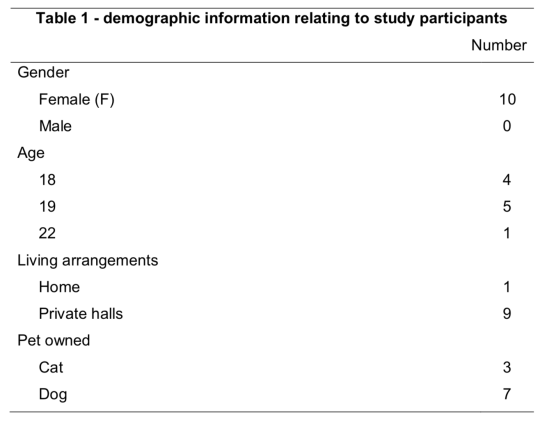
The materials section of your methods should include any equipment, resources (i.e. images, books, diagrams) or any other materials used in your data collection. You should also reference the program that helped you conduct your analysis. For example, if you are writing a qualitative research paper, you may want to include Microsoft Word in your materials if you use the program to transcribe interviews.
You should then describe the design used in your research. All variables should be identified in this paragraph, if relevant. You should also discuss whether your research is within-groups or between-groups, again only if relevant.
Last is your procedure section - the most important one! You must write this section with enough detail so that anybody could pick it up, read it and conduct the same experiment with ease. You should describe what participants were required to do, how data was collected and it should be written in chronological order! While it’s important to provide enough information, try not to overwhelm the reader with lengthy sentences and unnecessary information.
RESULTS
Your results section’s sole purpose is to provide the reader with the data from your study. It should be the second shortest section (abstract being first) in your research paper and should stick to the relevant guidelines in regards to reporting figures, tables and diagrams. Your goal is to relay results in the most objective and concise way possible.
Your results section serves to act as evidence for the claims you’ll go on to make during your discussion but you must not be biased in the results you report. You should report enough data to sufficiently justify your conclusions but must also include data that doesn’t support your original hypothesis or research question.
Reporting data is most easily done through tables and figures as they’re easy to look at and select relevant information. If you’re using tables and figures you should always make sure you’re stating effect sizes and p values and to a consistent decimal place. Illustrative tables and figures should always be followed by supporting summary text consisting of a couple of sentences relaying the key statistical findings in continuous prose.
DISCUSSION
The discussion section should take the opposite approach to your introduction! You should start discussing your own research and broaden the discussion until you’re talking about the general research field.
You should start by stating the major findings of your study and relating them back to your hypothesis or research questions. You must must must explicitly state whether you reject or accept your experimental hypothesis, if you have one. After stating your key findings you should explain the meaning, why they’re important and where they fit into the existing literature. It’s here that you should bring back the research you discussed in your introduction, you should relate your findings to the current understanding and state the new insight your research provides.
You should then state the clinical relevance of your research. Think about how your findings could be applied to real-life situations and discuss one or two practical applications.
After this, discuss the limitations of your research. Limitations could include sample size and general sample population and how this effects generalisability of findings, it could include methodological problems or research bias! These limitations will allow you to discuss how further research should be conducted. Suggest ways in which these limitations could be rectified in future research and also discuss the implications this could have on findings and conclusions drawn.
Finally, you need to give the reader a take-home message. A sentence or two to justify (again) the need for your research and how it contributes to current understanding in the field. This is the last thing your audience will read so make it punchy!
~~~~~~~~~~~~~~~~~~~~~~~~~~~~~~~~~~~~
That’s it folks! My tips for writing a kick-ass, high-grade research paper based on my personal experience. If you have any questions regarding things I’ve missed or didn’t provide enough detail of, then please just send me an ask!
Also, if any of you would like to read any of my past research papers I would be more than happy to provide you with them :-))
7K notes
·
View notes
Text
how I keep myself sane during summer break.
I think we can all agree that the mere idea of having holiday breaks from boring lectures and all-nighter study sessions sounds like heaven; although this romanticized idea of having so much free time often turns into wasted summer days, oversleeping, and basically an anti-social teenage version of house arrest. so, to help you out (or, more to help Myself) here are some things I do to keep myself busy, on a budget (kind of), and mentally healthy during long breaks from school.
continue your morning routine. this is important; by this I mean to basically treat your summer mornings as you would your school mornings, without the rush and alarm. brush your teeth, brush your hair, start/continue a skincare routine, get out of your pajamas and into real clothes, make your bed, make some coffee, eat some breakfast, do it with some music on, whatever you want. this keeps your mind and body into a daily routine. don’t let all your precious no-class mornings of summer go to waste!
savor sleeping in, but not too much. I know its super tempting to go to bed at like 2 AM and wake up the next “morning” at 12PM, but trust me, you’ll regret fucking up your sleep schedule once you actually have to set an alarm and get your ass to class next fall. I’m not saying you should force yourself to set a summer alarm (although, if you really want to train yourself this isn’t a bad idea tbh) but for the love of god, at least go to sleep and wake up at reasonable times. don’t waste your entire day!!
force yourself to see your friends a couple times a week, even if you really don’t want to. obviously this excludes mental health days, but I’ve found that spending time with my friends actually distracts me from any anxiety I’ve felt during the past week. I love my alone time, but human interaction is super important both mentally and physically. as college students we’re all pretty much broke, so don’t underestimate the power of free things- watching netflix at someone’s house, having a boardgame night, going to parks, you name it. as long as you’re with your friends, you’ll have a great time!
clean out your music library + make a playlist or two. y’all know I love a good playlist. this is something totally 100% FREE, and a perfect way to make use of your free time. delete all the stuff you don’t listen to anymore and make a few playlists of your favorite songs, or even go with playlist themes to organize your songs. it’s fun and your future self will probably thank you later for getting rid of so much audible junk.
get back into reading. this is something that was on my personal summer to-do list. I haven’t read a book for myself (aka not for a class) in sooo long, and let me tell you- I don’t know why I ever stopped reading. I know for a fact that once the semester starts I’ll have zero free time to read for myself, so summer is the perfect time to get into a new book or two!
eat your three meals a day +hydrate. I mean this. its very easy to skip/forget meals when you really don’t have any set schedule whatsoever, so plan your meals into your day. even make an alarm if its necessary. also: if you don’t know if you’re drinking enough water, you probably aren’t.
deep clean your room/workspace/closet. I’m super guilty for putting this off but, long breaks like summer are the perfect times to deep clean! what makes it easier for me to clean my room is to go section by section, which means not doing it all in a day (because that gets hella overwhelming and stressful, let me tell you). grab a garbage bag, put on some tunes, and pick a section to clean that day; you’ll be done with the entire space in no time!
outfit plan. for someone like me who has way too much in my closet and somehow still “never has anything to wear”, this is essential! set some outfits out on the floor/bed and take pics of them on your phone so that you can look back on them for some style inspo the next time you have “absolutely NOTHING to wear”.
find a new hobby, even if you’re bad at it. make some collages of your friends, make a scrapbook, learn photoshop, paint a little, learn how to sew, garden, cook, practice your phone photography skills… if there was a time for you to try out new things, it’s NOW.
make a post about all the shit you should do. I’m doing it right now. literally. you’re reading it right now. its not a bad idea.
if you know you have shit to do, plan it into your day! this is where the planner/agenda/bullet journal aspect comes in. having no class and no homework is not an excuse to stop planning out your day, your week, or your month. make some task lists and pencil in your dentist appointments and dates with people and whatnot; and even journal your days while you’re at it! if you’re a planner, never stop. Future You will thank you for it, I promise.
18K notes
·
View notes
Text
kinda wanna date someone but kinda never wanna risk getting my heart broken ever again, u see my dilemma
1K notes
·
View notes
Photo

If you’re not a morning person, you know the struggle. It’s not just about waking up, it’s about actually getting yourself to do stuff in the morning. While I usually recommend you adapt to your body’s own schedule, as you’ll work much better, school, work or other activities may not allow you to do so. Therefore, here’s a guide on how to get shit done in the morning.
The night before
Prepare whatever study materials you’re going to use that day. Open your notes and make sure you know where you should start (i personally lay a pen on the exact paragraph).
Put a bottle of water and some tea (with caffeine) or coffee on your desk so that you don’t have to go get it next morning.
If you’re usually cold in the mornings, get yourself a blanket. I promise you mine has made me more productive than all the coffee I’ve ever had.
Write a to-do list for next day. Then distribute those tasks in a schedule (you can either use a printable or just scribble it on some piece of paper). Take into account you’ll need time for breakfast and personal hygiene.
Other than that, don’t leave anything else on your desk, as it may be distracting.
Make an effort to go to bed at least an hour earlier. It makes a huge difference when you wake up
Actually waking up
if you struggle to wake up, try the following:
Ask someone to wake you up (a parent, a roommate).
Put your phone accross the room and inside a glass to amplify the sound.
If your phone has an option for voice alarm, use it. Make it something really motivating or, even better, really annoying.
Combine all of the above for foolproof results.
Tips to get stuff done
Chug your liquids! - The very first thing you should do after your feet touch the floor is drink some water and drink something caffeinated (yes, in that order) (caffeine because it will kick in by the time you’re done with breakfast and water because caffeine can be dehydrating + water will also jumpstart your body).
Put on some fluffy socks - okay maybe this is just a personal thing but I’m personally much less likely to go back to bed once i have some socks on.
Smol workout - do something that will send blood to your brain. It can literally be ten jumping jacks.
Breakfast? Not yet - you’ve gotten up, you want food, understandable. BUT remember that book/notebook you put on your table last night? Well, get to work on it for 15-30 minutes. You may be sleepy and not able to comprehend much of what you’re doing, but the important thing is that once you come back from having breakfast, you will already have started, which is the most difficult part.
Avoid anything with a shit-ton of sugar - it will give you a sugar crash in about an hour and all you’ll want to do is go back to bed. (Personal rec is overnight oats with some fruit on top - delicious, fast af and super filling and energizing).
A big breakfast can make you sleepy. Instead, make it a little bit smaller and have some healthy snacks (like hummus) throughout the morning. Look at them as your reward for studying.
Stay off the internet. During breakfast, I find that social media (especially youtube) tend to put me off working afterwards, as they give me something more insteresting to do. Therefore I reccommend you either find something else to do (write your to do list, read a book) or limit your Internet time to 5-10 minutes.
Remember that you control your mindset. If after doing all of this you still don’t feel like studying, it’s perfectly okay to stare at your desk for five minutes and have an argument with yourself about how much you do want to study. Seems stupid but trust me, it works most of the time.
Other masterposts
How To Stop Procrastinating
Random College Tips
Skincare 101
Memorization Tips
Tips For New Studyblrs
Use Studyblr to Become Productive
15K notes
·
View notes
Photo
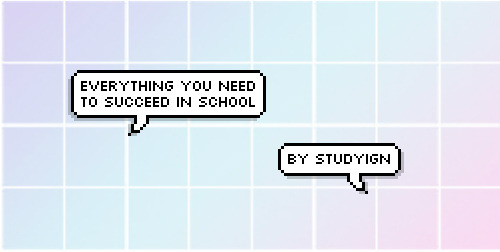
i get a LOT of questions about time management and getting better grades so i decided to put a boat load of advice and links in one place :]
time management methods
start a bullet journal ( +mine / +insp )
the 5 day study plan - it works!
schedule blocks of study time
use excel to schedule study
how to schedule study
the sticky note method
an app that organizes time for u
15 ways to beat procrastination
balancing multiple AP classes
decision making and time management
use the pomodoro technique
the task box prioritizing method
how to cram a lot of information in
get organized!!!!!
make and use a syllabible
great organization advice
organize ur study space
more tips on study spaces
basic organization tips
cute infographic
printable planner sheets
simple 2 pocket folder method
study methods!!!
watch youtube crashcourses
best study tips ever tbh
tips on memorizing effectively
add color for visual interest
make cause and effect diagrams
making good flashcards
create summary foldables
margin note taking
the 2 notebook method
for when ur not motivated
reading long textbook passages
studying for a test ooh
basic note taking
+note taking tips
note taking in microsoft word
bs study guide
how to plan out an essay
more essay planning
annotating literature for english
how to make concept maps
really interesting way of studying
shit load of study methods
web resources!!!!
search engine that plants trees!
to do list web program
bedtime calculator [avoid grogginess]
the dictionaries u need omg
how to pull an all nighter
advice on how to properly use google
final grade calculator
>100 places to download literature
cute af school supply list
alternatives to overpriced textbooks
rly this is better than google
best writing checker ever its my fave
free academic journals for research
AP cramming packets
every website to make a bibliography
online used book store
mind map making software from tufts
khanacademy aka bless this site
stop procrastinating websites
free powerpoint
awesome synonym finder
apps u need to download!!!
google chrome app i love it
taking digital notes
like 14 useful school apps
attn: all writers get this
super cute time manager
>9 different studying apps
post it note app
study + give water to needy!!
relaxation n meditation help
sat help!!!!!
all kinds of essential vocab [2k+]
big collection of links
v solid page with lots of references
rly good advice imo
how to do well on the sat
general big exam advices
stress reliefs!!!!
rly good study snacks
badass instrumental playlist!
finish ur essay songs!
+all my fave study playlists!
treat urself on a low budget
read some rad articles
teach urself computer science
take the 10 day study challenge
rip some crap online
good things to do in study breaks
+100 more things in study breaks
if u tired and uninspired
avoid student burnout
watch a ton of broadway musicals
nice things for urself
anxiety relieving background sound
+masterposts!!!
back to school advice
productive summers
note taking methods
starting a study blog
time managements
succeed @ school
ap world history
study instagram
web resources
ap psychology
bullet journals
school advice
happy things
ace ur exams
study sounds
stress reliefs
annotations
essay writin
study 101
printables
sat help
+more
i hope some of this was helpful ~ i also have a youtube channel and instagram account with a whole bunch of study resources!!!! ~ xoxo sareena
71K notes
·
View notes
Photo
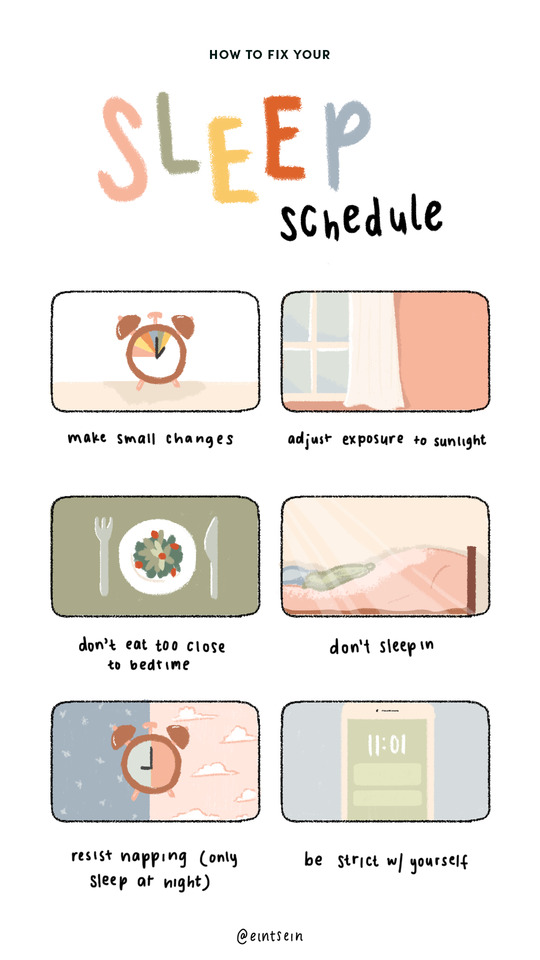
How to Fix your Sleep Schedule
We’ve all been there. You’ve been pushing back your bedtime for an entire week and now you feel exhausted and you don’t think you can function as well as you normally could. You just want to get enough sleep again, but how?
Make small changes
It’s a lot easier to push back your bedtime than to push it forward—but it’s not impossible. You just have to take it step by step. Go to sleep 15-30 minutes earlier every night until you reach your desired bedtime. You could try going to sleep much earlier than your regular time, but according that doesn’t usually work out. If you’re waking up later than you want to, you might also want to try waking up 15 minutes earlier each morning until you get up at the desired time.
I remember there was a week this semester when I went to sleep at 1am for several days in a row (I usually sleep at 11). I was sleep deprived and exhausted and I tried to sleep at 8 to catch up on lost sleep, but I couldn’t. I just laid in my bed for an hour until I gave up trying to sleep and decided to work on some homework until I felt sleepy again. What I should’ve done was go to bed 15 minutes earlier each night until I could go to sleep at 11 again.
Adjust exposure to sunlight
Exposure to adequate amounts of sunlight is key to helping our bodies maintain their circadian rhythm, which is the process that regulates our energy levels during the day and tells us when to be awake and when to go to sleep. Sunlight helps our body produce optimal levels of melatonin, a hormone that makes us feel sleepy at night. Studies have shown that people get better quality sleep in the summer because there is a greater exposure to light.
That being said, you should expose yourself to more light during the day to get better sleep at night. This might mean waking up earlier so you don’t miss hours of sunlight in the morning.
At night, you should reduce your exposure to any sort of light - both natural and artificial - so that your body knows it’s time to not be awake. I personally turn down the lights (and only have my fairy lights on) after 10:30 pm. When you’re trying to get back into your desired sleep schedule, you could aim to turn down the lights 30 minutes before your desired bedtime for that day.
Don’t eat too close to bedtime
You should wait 2 - 3 hours between dinner/your last meal and bedtime. I would talk about how studies show that eating too close to bedtime can possibly damage your health, e.g. causing reflux when you’re lying down, but that’s all been said before. The only thing I’d like to reiterate is that you sleep better when you wait after you eat. But as for my own logic on why you shouldn’t go to sleep when you’re full…
When you wait a few hours after you’ve had your last meal, before you go to bed, you won’t go to bed full, meaning that in the morning, you’re likely to be hungry. I don’t know about you, but I can’t go back to sleep when I’m, like, starving, so being hungry when I wake up causes me to resist sleeping in.
Don’t sleep in
You would think that sleeping in is, in fact, good for catching up on sleep. In reality, it doesn’t make you stop sleeping late, since you’d probably still spend the same amount of time awake. Instead, once you wake up, you should stay up, and don’t go back to sleep. You’re likely to get sleepy at an earlier time, and this will help you push forward your bedtime.
Resist napping
Resisting naps also has a similar logic to not sleeping in. If you take a nap, you’ll feel more energetic and night, and you might not be able to fall asleep as soon as you wanted to. If you resist taking a nap, however, you’ll be more tired at night, and you’ll fall asleep more easily.
Be strict with yourself
Finally, the key to having a good, consistent sleep schedule is to be strict with yourself. Don’t let yourself stay up for just 5 more minutes because you still have a ‘small’ task to take care of. When it’s time to end the day, end the day.
Maybe it’s hard for you to be strict with yourself since you can’t justify going to sleep over completing whatever task or responsibility you have left. Well, here’s my logic:
You could stay up 5 more minutes and risk extending that to a few hours or so in attempt to finish something. There’s no guarantee that you’ll finish it, and you might just lose all those precious hours of sleep for nothing, since you’ll wake up in the morning tired and unable to effectively do the task you wanted to do; or
You could stop everything you’re doing and sleep on it. You wake up in the morning feeling refreshed and clear-headed and ready to tackle on your tasks for the day. You find a new way to think about the task you were stuck on, and you finally solve it in less than half an hour.
I do realize that this only applies if the task isn’t super urgent. Let’s say you have a project due 11:59 PM and you’re rushing to finish that. In this case, the core problem is probably something else: an inability to manage your time, or procrastination. If that’s the case, you might want to check out my posts on how to beat procrastination and how to create an efficient (revision) schedule. The latter post is tailored for exam preparation, but the main ideas are the same for general scheduling (there’s a recap at the bottom if you just want to know the main ideas).
Additionally, you might wanna check out my post on my night routine.
And that’s all I have for you today! Hope this was helpful, and if you have any questions, feel free to drop me an ask or message me. Have an awesome day :)
9K notes
·
View notes
Text
good emotional skills to know 4 college but also in general
this is stuff that i’ve found helpful and am in the process of working on. they may not be achievable for you without help and may not work for your specific circumstance, but this is a list of suggestions that you might be able to think about. i am also not a mental health professional so please do feel free to contradict me!!
self soothing. having a toolbox to take care of yourself by yourself. bc sometimes nobody else is available and you just gotta put some lotion on, listen to a tune, and go to bed early.
checking in. checking in with yourself to see if you’re okay. knowing how to alter your strategies when your strategies aren’t working. knowing when your strategies aren’t working. this is just taking some time every day to reflect on what goals you didn’t meet and why and what you can do to fix that.
there’s nothing you “should” be doing. if you get caught up thinking “i should be doing x” that’s false! stop that! “should” be doing better implies that you have some obligation to do whatever it is that you “should” be doing. you don’t owe anybody except yourself. analyze why you think you should be doing that thing and change that into…. “i want to be doing x because…” or “doing x will make me happier, because…”. overall, more productive and less self-shamey.
disconnecting from the crowd. eating in a crowded dining hall can be stressful! knowing how to be alone in a crowd and stay calm is helpful
being okay with being alone. tbh college is kind of… being alone a lot, in my experience. even though you’re surrounded by people, a lot of time is spent alone. making friends is hard. your friends have different schedules. you’re busy. shit sucks. we make the best of it.
knowing yourself. this relates to a lot of what i’ve already said but like. knowing your emotional state and knowing what helps trick the monkey brain is helpful. stop repressing your feelings, friends.
talking to strangers. ordering from a menu! paying library fines. going to office hours. asking for a cashier at the register if there isn’t one. ya this is hard. ya you gotta expose yourself. sometimes i just try playing a persona. like this isn’t me ordering a sandwich. this is a cool me who knows how to talk to people who is ordering a sandwich.
you don’t have to be friends with your roommates. you just have to live together in a way that doesn’t make you two hate each other. ideally, you two will coexist in a way that doesn’t interfere with the other’s daily life.
give and taking. on the topic of roommates, sometimes your roommate can be a shitty person, but sometimes you are the shitty person! give a little but if they’re negatively impacting your life, communicate.
communicating during disagreements. explain what your emotions are instead of blaming them. “i feel hurt when you…” or “i feel frustrated when” or “i feel unappreciated when.” if things get heated, ask if you both can take a ten minute break and then come back. and don’t bring up disagreements when the other party is preoccupied or going somewhere. you can legitimately schedule a discussion.
it’s okay to apologize. learning to swallow your pride gets easier each time.
knowing that people work differently than you. some people are not gonna click with you and it’s gonna seem like they have this whole brain process up there that is totally unlike yours. and yeah! that’s how it is. and that’s chill if they aren’t hurting anyone else. work with them and be flexible!!
comforting people. you will probably/definitely see someone cry! hell if i know how to comfort people. someone please help. but some things i’ve learned are: 1) different people need different things. different people need different things! 2) people need different things at different times. 3) you can ask them what they want and it won’t be weird. 4) apparently a lot of people like hugs? but ask. and it’s okay to not want a hug. 5) just show that you care in some way if you don’t know what they need. i used to think that if somebody needed to tell me what they needed it was a sign that i just didn’t know them well enough and we weren’t compatible or i wasn’t being a good friend. that’s fake! friendship isn’t based off of fitting naturally in every way and making an effort to be good for them is important.
knowing it’s okay to not be liked by everyone. it’s okay if strangers think you’re dumb because you said something dumb in public. you know you’re not dumb. it’s okay if not everybody you meet likes you. it’s okay if you do something cringey. everybody has their own shit to deal with and you will not shatter their world. grow and move on!
forgiving yourself. i’m trying this new thing where when i feel embarrassed about something i say. out loud. “i forgive myself.” and then i just try to grow from that and move on without getting caught in a spiral of shame.
knowing what you need vs what you want and what is better at the time. what you need: a shower. what you want: to not do that. solution: take a shower! or maybe what you actually need is to go to sleep? but guess what. you probably know what is good for you. the hard part is actually doing it.
realize that building habits is less work than discipline. emotional effort is expended every time you have to make yourself do something. just make it part of your routine and you’ll just think it’s normal to do all the good things! like, for example, i’m trying to make it a habit to eat structured meals instead of a “eat when i’m hungry” thing because i know that makes me skip meals, which is bad!
you won’t be able to do everything. forgive yourself for that. write down things that are top priority and focus on them. everything else is not important right now and you shouldn’t beat yourself up for not being able to do them.
your health is important. i’m not saying health will solve all your problems. it won’t! but health will cause a lot of your problems to go away. because let’s face it. not sleeping causes a lot of problems.
it’s okay to ask for help. we say this a lot but it’s hard to internalize it. here’s a thought: there’s so much shame and hesitation about asking for help so by doing that you’re actually being proactive (which is respectable) and mature, and therefore… not weak or stupid. ask for help even before you need it! most people love to help others. and especially take advantage of people who are OFFERING help. for example: counselors at school or TAs. it’s literally their job. they want to do it. and if you don’t want to talk to anybody in real life, my inbox is always open.
16K notes
·
View notes
Photo

Hey guys! So I was requested by the lovely @lexholleran to make a post on how I stay focused and motivated. So keep reading!
F O C U S
Turn off all unnecessary electronics. This is non-negotiable. If it’s off, you won’t be tempted to use it. Even better, put your phone in a room far away or give it to a friend/roommate/parent for them to hold.
Schedule in breaks. If you know when your breaks are going to be, you’ll be less likely to go on Facebook or Tumblr when you’re supposed to be studying.
Find your study zone. What kind of music and environment makes you the most productive? How many breaks should you schedule in? Get to know how you work best so you can replicate that scenario in order to maximize your focus.
Here are some websites/apps to help you:
Forest: App or Chrome extension that grows a tree for every 30 minutes you go without touching your phone or checking a “blocked site” like Facebook, Tumblr, Instagram, etc. (Costs $0.99 on the App Store but is free for Chrome)
UNICEF TAP Project: For every 15 minutes you go without using your phone, UNICEF and TAP Project sponsers gives a day of clean water to a child in need.
Rainy Cafe: provides ambient noise for those who like to study in those kinds of environments
Tomato Timer: Website that is just a simple Pomodoro timer.
M O T I V A T I O N
The biggest piece of advice I have for you regarding staying motivated for long periods of time is to find a goal within yourself that you’re working toward. I’m not talking about just getting an A on that one test or even getting into a certain college. Of course, these are good goals to have, but in the long run these kinds of goals are too narrow and too much of it lies outside of your control. Maybe you weren’t feeling your best on exam day or it just so happened that the one section you weren’t that sure about was the main thing tested. The same thing holds true for college acceptances; so much of it is based on luck because there are too many qualified people and too little spots. Literally anything could have contributed to your acceptance or rejection: your race, the classes you took, your personal statement, the admission officer’s mood, etc. And working only for a grade or a college acceptance letter places you in a vulnerable position where the validation for your efforts is external. This kind of mindset can easily lead to depression or anxiety over school and will leave you feeling discouraged and unmotivated if you don’t get that perfect score you were hoping for.
In my experience, it is only when you stop working for arbitrary factors and start working for yourself that you truly become motivated. You study because you want to work hard, you want to be more educated, you want to know more about the world. By looking at it this way, your goal becomes one of self-improvement. This mindset doesn’t beget feelings of inadequacy or depression because your validation for your efforts comes from yourself, not an external source. This will make you more motivated because you are the one telling yourself you’re good enough. That internal feeling of warm happiness you get when you’re productive will make you want to keep working. And even if you get a bad grade or don’t get into your dream school, you will know that you tried your best and came out the other side better for it. So work for yourself and no one else.
3K notes
·
View notes
Photo




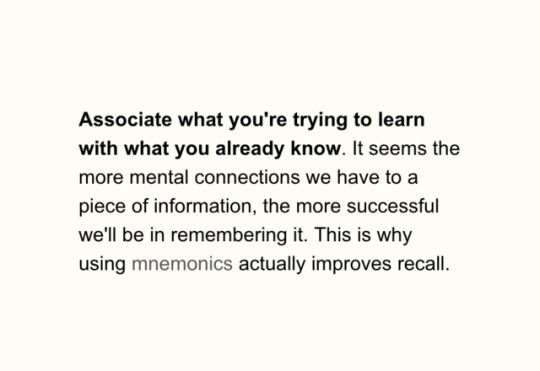

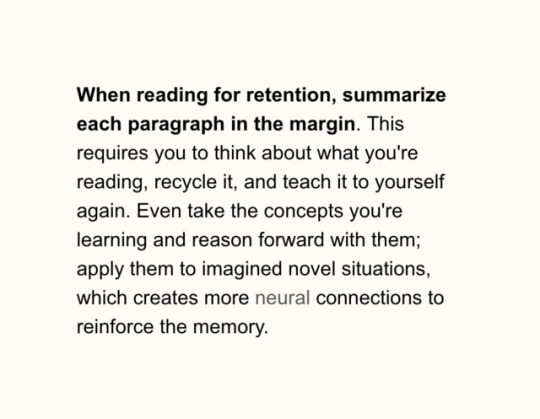

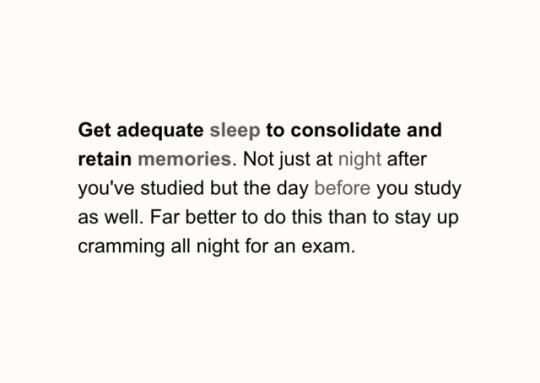
Eight Ways to Remember Anything by Alex Lickerman M.D.
Reference: Research-based strategies to boost your memory and keep it strong via psychology today
58K notes
·
View notes
